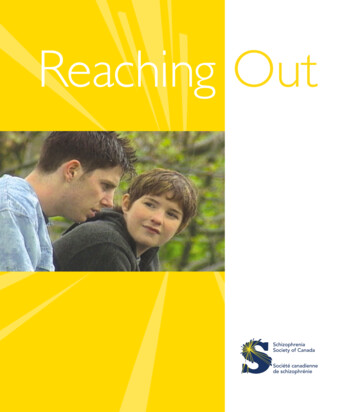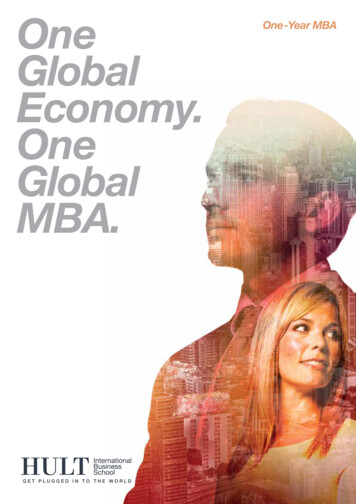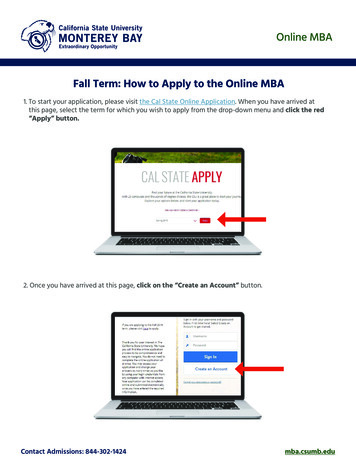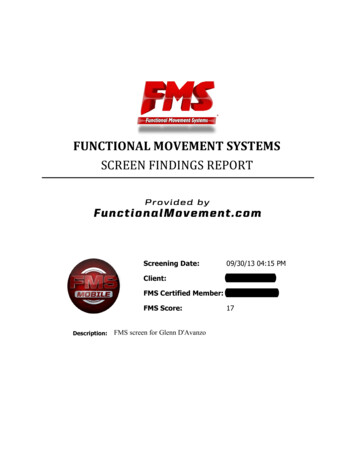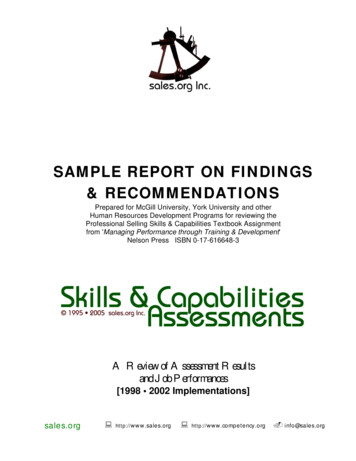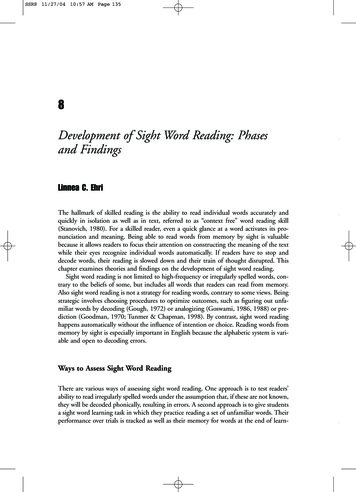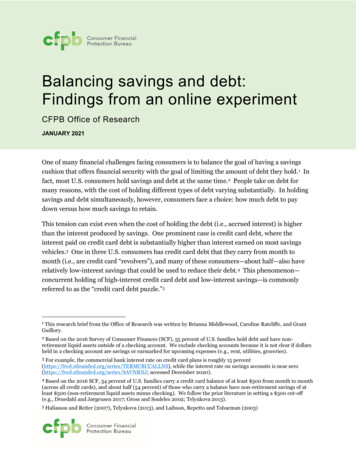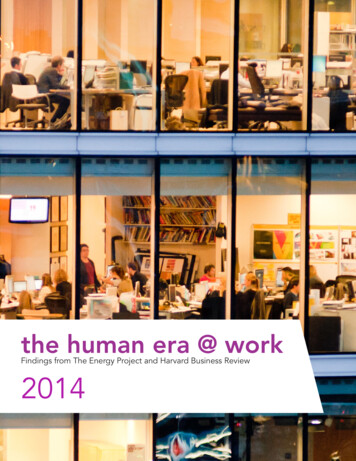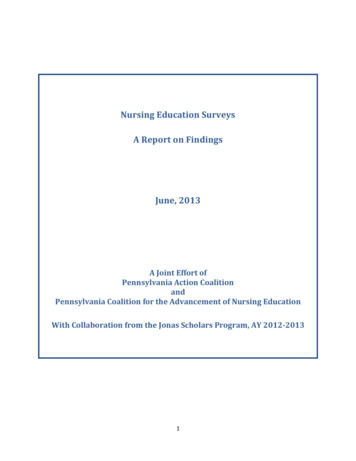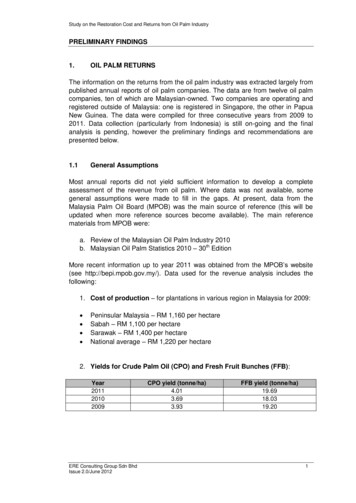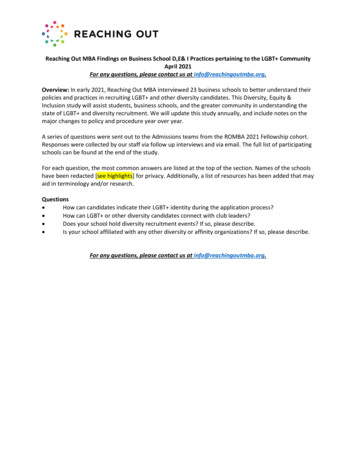
Transcription
Reaching Out MBA Findings on Business School D,E& I Practices pertaining to the LGBT CommunityApril 2021For any questions, please contact us at info@reachingoutmba.org.Overview: In early 2021, Reaching Out MBA interviewed 23 business schools to better understand theirpolicies and practices in recruiting LGBT and other diversity candidates. This Diversity, Equity &Inclusion study will assist students, business schools, and the greater community in understanding thestate of LGBT and diversity recruitment. We will update this study annually, and include notes on themajor changes to policy and procedure year over year.A series of questions were sent out to the Admissions teams from the ROMBA 2021 Fellowship cohort.Responses were collected by our staff via follow up interviews and via email. The full list of participatingschools can be found at the end of the study.For each question, the most common answers are listed at the top of the section. Names of the schoolshave been redacted [see highlights] for privacy. Additionally, a list of resources has been added that mayaid in terminology and/or research.Questions How can candidates indicate their LGBT identity during the application process? How can LGBT or other diversity candidates connect with club leaders? Does your school hold diversity recruitment events? If so, please describe. Is your school affiliated with any other diversity or affinity organizations? If so, please describe.For any questions, please contact us at info@reachingoutmba.org.
1. How can candidates indicate their LGBT identity during the application process?Analysis:Application: Asking these three questions show attention to the variety of responses as it relates toLGBT identities. Selections can include pre-set answers along with the option to either A. omit ananswer or B. write in their own (which is preferable).Provide question on genderProvide question on sexual orientationProvide question on pronounsInterview: While this is an option for candidates, overall it appears to be the least popular way toidentify. This can be due to fears of backlash, inexperience in actually speaking about identity, or worrythat it might negatively affect candidacy.Resume: Listing any experience working for the LGBT community is not always an indicator of LGBT identity, but at least can identify an applicant as a strong ally.Essay: For those who include an optional or required essay, this is a very logical place for candidates toidentify as LGBT and explain experiences or work within the community.Additional Signifiers:Some schools list out scholarship opportunities that are available to individuals of specific identities. Theymay also have a checkbox question which allows applicants to indicate interest in specific affinity groups.Responses (edited for clarity and anonymity): Self-select areas of interest (Diversity events, Women’s events, LGBT events, Military VeteransEvents) We ask optional questions about applicant’s gender identity and sexual orientation on theapplication. There is a question on the application to self-identify as LGBT . In our application, we have a menu of identifications for gender identity along the spectrum,along with a menu of answer options for sexual orientation. We collect this data to use tosupport students as needed. Candidates can indicate whether they identify as LGBTQ on the application. There is a questionthat explicitly asks if an applicant IDs as such. It is obviously a completely optional disclosure.We also have a section for applicants to enter their pronouns. Individuals can disclose this information with members of the admissions committee, via ouronline inquiry form, or on our application. Self-identify gender and pronouns on application and list identity in essay, resume, or interview. We ask the following on applications: Would you like to provide information regarding yourgender, pronouns, and/or sexual orientation? Do you identify as a lesbian, gay, bisexual ortransgender person? If yes, may we share your contact information with our LGBT club? Questions throughout the application that ask, "Would you like to provide more information?"for example, with the question of sex. There is also an opportunity for an optional essay inwhich we invite candidates to introduce themselves to the admissions committee and sharemore about their personal story.
There is an opt-in option where we ask for individual’s pronouns with a write-in field as of lastyear. In our outreach communications, we want to honor those who are not ready to be out. Wehave worked with [other faculty from the college who focus on diversity and gender]. Wediscuss and provide education faculty/staff/students about why pronouns are important andhow to incorporate them into technology and conversation.On our application, we have sex, gender identity, and pronoun section. Sex - Female, Male, andOther. Gender Identity is Agender, Gender non-conforming, genderqueer, man, non-binary,two-spirit, women, prefer not to say and enter your own. Personal Pronouns includeHe/Him/His, She, Her, Hers, They/Them/Theirs, Ze, Zir, Zir, None (Name only), Prefer not tospecify or enter your own. Sometimes students also share in their personal statement orinterview.There is a myriad of ways for LGBT individuals to indicate their identity during the applicationprocess. We’ve introduced a third “Non-Binary” option for gender on our application this year.We’ve already had a couple applicants identify as such, which is great to see. They can alsoindicate their sexual identity (Gay or Lesbian, Bisexual). They can indicate their spouse/domesticpartner/significant other. They can address it in multiple essay prompts if they find itappropriate to do so. Extra-curricular Activities and indicating interest in our LGBT group(although allies indicate interest as well).There is an optional question on our application asking if they identify with LGBT . We also askif they would be interested in the ROMBA fellowship.We reach out to our applicants to let them know about the ROMBA fellowship and tell themwhat it entails and if they are interested to let us know and go from there. We also identifyinterest in our LGBTQ organization on our application – this identifies both members of theLGBTQ community and allies as well.Our application offers a checkbox for applicants to indicate if they have an affiliation withROMBA. And of course, an applicant may include information about their identity in theiressay(s).There is a section on the application form that candidates can indicate their LGBT identity. Wealso welcome candidates indicating this in any other part of their application and someapplicants have drawn on examples for the essay questions in relation to their LGBT identity.Applicants can also indicate their interest in the LGBT ROMBA Fellowship on the applicationform.We have optional essay questions, including one specific for those who want to apply for theROMBA Fellowship. We also have a drop-down menu where students can select “Interest inLGBTQ initiatives” on their scholarship application, and an option for applicants to include theirpreferred pronouns. It’s our understanding from the University that we are not allowed to ask ifcandidates identify as LGBTQ strictly for statistical purposes. I’d be curious to know if otherschools are bound by the same laws.Candidates can choose to identify as a member of the lesbian, gay, bisexual, transgender (LGBT)community on the application, and are told that while their response will not affect theadmissions decision, it may lead to consideration for the Reaching Out LGBT Fellowship.We also remind prospective students to let us in admissions know if they would like to connectwith current students or club leaders and facilitating these connections is something we dooften.
The [school’s] MBA application has an optional essay where candidates can share their LGBT identity, candidates should inform the admissions professional of their identity and communityinterests. The interview session is another outlet to share your story.We have two questions on our application around sex/gender. There is also a question aroundinterest in different clubs including [our school’s LGBT club]. We only submit their informationto clubs if they have self-identified interest and are okay with sharing their identity with clubs.We also accept the Consortium application as well. Additionally, we have two essays thatapplicants can choose from, a career-oriented focus or creative focus (Pick 6 images with briefcaptions about who they are outside of academics).We don’t have a field for candidates to indicate their LGBT identity. We have a field in theapplication that prompts applicants to indicate which communities at [our school] they wouldbe interested in connecting with/receiving more information on – LGBT is one of the options.We don’t ask for sexual orientation on their application form as it’s a protected characteristic. IfLGBTQ candidates want to indicate this, it would be down to them to highlight in theapplication itself or something like applying to the ROMBA scholarship.
2. How can LGBT or other diversity candidates connect with club leaders?Analysis:Most clubs have a website that is listed either on the Admissions page or under student groups andincludes the club leaders’ contact information. The Admissions team can also make introductionsdepending on what interests/affinity groups candidates would like to speak with a representative about.Some schools also involve club members in the Admissions process as potential interviewers or applicantmentors.Responses (edited for clarity and anonymity): These applicants can connect with club leaders in a few ways: They can reach out directly to theclub leaders of their choice on our website. Or they can attend any event hosted by our clubsand connect with them in that way. Our LGBT club president is an ambassador and listed on our website. The club leader's email is on the website or the admissions team would be happy to make anintroduction. They may reach out directly to any of our clubs through contact info shared on our website orthrough recruitment events. Located on our website, it breaks down five DEI focused pages (students of color, veterans andmilitary, women, LGBTQIA , and international students) where it reviews support services,student resource groups, and individuals that they can connect with about life in [our school’s]MBA program. Club leaders are posted on [our school’s website pages], which are accessible to currentstudents only. A list of the MBA-specific student clubs and committees are at the bottom of theschool website. If there are specific club leaders that candidates would like to connect with, theycan reach out to the Admissions Team. Candidates can connect with club leaders via their contact page on their website. Club leaders are available via our website under Life at [our school]/Clubs & Organizations. Weare in the process of refreshing our Partners Club website and encourage LGBTQ candidateswith partners, spouses, or significant others to connect with them as well. Contact information for club leaders is posted directly on our student clubs’ website. In additionto the LGBTQ Business Student Association affiliated with [our schools], students can also jointhe [LGBT club for graduate students], which represents LGBTQ graduate students. They alsohave access to programming and resources through [our school’s gender and sexuality school]. We have a list of MBA Student Ambassadors listed online with the clubs they are a part of.Candidates can connect with [our school’s LGBT club] members via the list. Direct connectionto club leaders can also be found online. We make it very easy to connect with our leaders at [our LGBT club]. The [LGBT club]webpage has all the photos, e-mails, and LinkedIn of the Board. They also have two VPs ofAdmissions and Outreach who are typically the first point of contact. Details of our LGBTQ Business Club can be found on our website; both have pages with contactdetails and LinkedIn Groups. [Our school’s LGBT club] has an outreach cabinet that connect with Pre-MBAs and alumni. Wehave a brand-new website with information about the club and hold coffee chats with
prospective students to give them a glimpse of life on campus and in the club. There is also aLinkedIn page/newsletter that goes out biweekly to update club members and includes ally info.Individual student connections are facilitated by admissions or graduate assistants ofadmissions. Also, club leaders are involved in our affinity visit days.Our Connect with a Student Tool allows prospects and applicants to sort current students by avariety of affiliations (industry, concentration, etc.). For those looking to connect specificallywith members of the LGBTQ /broader diversity community, there is also a way to sort currentstudents by their [school] group affiliation – including [our LGBT club].Each program page on our website includes “Diversity and Inclusion at [our school]” whichprovides information about scholarships and fellowships, clubs and organizations, and campusresources.They just need to ask and if there is a specific club they want to connect with they can tell us.We also have our ambassadors on the website, so if there is a specific person, they can requestthem.We will typically offer to connect those with LGBTQ interest, with current or previously[members of our LGBT club]. However, their contact info is not available publicly. The sameapplies to those who identify in other diverse/under-represented groups.We recommend starting by connecting to the [student ambassadors], Consortium Liaisons, [ourLGBT club] Leaders, or International Student Representatives (Int’l).Yes, we have annually held several events for women specifically applying to the programthrough our [event name] where we partner with large organizations in [our city] and holdseveral talks and networking sessions discussing women’s and gender issues in the workplace.We also attend various [women’s organization] events each year and our Women inManagement Association (Student Club) hosts a big conference each year where prospectivestudents are invited to join.The Full-Time MBA Program’s Student Resource Groups are led by passionate and supportivestudents that want to see their colleagues, group, and program grow to its full potential. Duringthe application process, perspective students are connected to current students in the followingways:o Attend in-person or virtual presentations on what it is like to be a student in ourprogram.o Directly connect with various DEI students and group leaders from the start of theapplication process through deposit and matriculation. A core foundation of ourprogram is teamwork, and this is shown by the continued comradery from the momenta student shows they are interested in our nationally ranked program.[Our school] has a student club for LGBT MBA students. Prospective candidates can connectwith student leaders of this club. This connection is done both by request and proactively.There are lots of opportunities, candidates can reach out to [our school’s LGBT club] to start.On our diversity page, we list the partnerships we have with diversity organizations. There aredifferent market leads within Admissions (Asian countries, LGBT , Southwest US and Veterans)are directed to those leads. There are also office hours. We work closely with [our school’sLGBT club] to connect with candidates.We have specific LGBT events separate from our affinity groups. For women’s events, LGBT events, and underrepresented minorities, they can connect with the clubs individually. There isa recruiting event every fall specific to LGBT candidates, held in conjunction with the LGBT club and Admissions office. If indicated as LGBT and okay with sharing their info, the club
leaders will do outreach at interview/admit level as a touchpoint. This includes prepping forinterviews, talking about the community.LGBT candidates can connect with club leaders in a number of ways, we have events that wehost throughout the year that candidates can attend, and we are able to connect applicantswith leaders of [LGBT MBA club] during the interview/admissions process. Candidates can alsoreach out to club leaders through LinkedIn.
3. Does your school hold diversity recruitment events? If so, please describe.Analysis:Many affinity groups/clubs have specific diversity events that partner with admissions departments.Among the more popular events are those for LGBT people, women, veterans, and people of color(sometimes divided by ethnicity). In addition, there are broader diversity events that invite membersfrom staff, faculty, and students to share personal experiences to demystify stigmas, highlight thediverse population of the school, and show how to conduct difficult conversations. These events can bedivided into any combination of prospective applicants and admitted student focus, both occurring inperson and virtually. The diversity events may also invite outside organizations to join their virtual eventsto talk about opportunities to get involved as a current student.Responses (edited for clarity and anonymity): Yes, it varies. Last Fall we hosted a Fall Webinar Series focused on highlighting each of ourdiversity groups, including our LGBT community. The webinar was hosted by [our school’sLGBT group]. We have also hosted mixer type events that coincide with the ROMBAconference. Last year it was virtual and the year before it was in person. We also hostnetworking events throughout the year that are coordinated with [our school’s LGBT group]and other clubs. Yes, we host a number of diversity webinars throughout the year including an LGBT webinarand a series of women’s webinars. Yes. We host diversity recruiting events in the spring and fall. Typically, the fall is designated forin-person (on-campus/off-campus) events. These include: Diversity Weekend – Diversity @ [ourschool], Women @[our school], LGBTQ @[our school], Military @[our school], and ourEmerging Leaders Seminar. In the fall, we also host a number of diversity recruiting onlinepanels which include our affinity clubs and the consortium cohort. We hold a number of diversity related recruitment events which are advertised on our [school’s]MBA Admissions Office events website. We have two LGBTQ visit days in particular that maybe of interest. One is offered in the spring, typically March/April and another in the fall, typicallySeptember/October. Yes, we host bi-annual affinity visit days - Women, LGBTQ, Students of Color and Military Visitprograms. These visit days include interactions with our student affinity groups of each identity.This we’ve also added two other events - an all-MBA student and alumni panel to talk abouttheir experiences (March) and an “Ask me Anything: DEI at [our school]” (May). Yes, in the fall we host an Equity and Inclusion Summit with our [school] MBA Preview Day. Weoffer programing from our chief diversity officer, connect candidates with student leaders fromthe various organizations, and dedicate time to talk about our partnership programs likeROMBA. We host a variety of diversity recruitment events, designed to engage both prospective studentsand recent admits. We host Coffee Chats and 1:1 Office Hours with Admissions staff. We hostevents broadly designed to engage diverse prospects/applicants – such as Diversity Week. Thereare also student-hosted events that diverse prospects/applicants are invited to attend. Yes, this semester we are hosting a "Noon Networking Series" where we have in invitedstudents and alumni to represent different groups/aspects/industries in a 30-minute networkingevent on Zoom. We are also collaborating with the [local area] MBA Consortium schools to host
ou
Reaching Out MBA Findings on Business School D,E& I Practices pertaining to the LGBT Community April 2021 For any questions, please contact us at info@reachingoutmba.org. Overview: In early 2021, Reaching Out MBA interviewed 23 business schools to better understand their policies and practices in recruiting LGBT and other diversity candidates.
